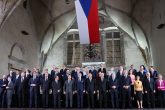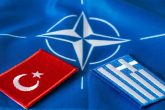President Recep Tayyip Erdoğan receives a lot of attention at each summit that he attends. That was the case at the Shanghai Cooperation Organisation’s (SCO) Samarkand Summit and at the opening of the United Nations General Assembly’s 77th Session. The European Political Community Summit, which took place in Prague on Thursday, was no exception either. Due to his 20 years of experience and exceptional diplomatic efforts amid the Russia-Ukraine war, Erdoğan distinguishes himself as a leader on such occasions. Some leaders could get face time with Erdoğan at the Prague Summit, whereas others tried and failed. The Turkish president inviting French President Emmanuel Macron to join the Turkic Union and his meeting with Armenia’s Prime Minister Nikol Pashinian attracted most attention. By contrast, Greece’s Kyriakos Mitsotakis and the Greek Cypriot administration leader, Nicos Anastasiades, could not meet Erdoğan despite efforts by some European leaders to set up those meetings.
Erdoğan’s statement to the press featured five important points: 1) Türkiye does not view the European Political Community as an alternative to European Union membership. 2) Ankara is ready to normalize its relations with Yerevan without preconditions, provided that Azerbaijan and Armenia take the necessary steps toward peace. 3) Erdoğan could meet Syria’s Bashar Assad when the time comes. 4) Türkiye’s stance on Sweden’s NATO membership remains unchanged, but Erdoğan has given the green light for Finland’s admission. 5) His earlier remarks about Greece – “We could arrive suddenly one night”— was a serious warning, not a bluff.
Those statements show that there could be some progress regarding normalization with Armenia and Syria, whereas tensions remain high between Türkiye and Greece. Keeping in mind that both countries will hold elections soon, it is necessary for Athens to cease its acts of provocation in order to de-escalate the situation. Taking steps to de-militarize the relevant islands immediately comes to mind.
On the flight back home, Erdoğan had a chat with a group of journalists, including myself, and made important remarks on deploying armed drones to the Turkish Republic of Northern Cyprus (TRNC), the religious headscarf issue, the Alevi opening and his commitment to protecting the family. It seems that the public debate over a proposed constitutional amendment on the religious headscarf and the protection of the family will heat up over the next few days. Specifically, Erdoğan’s attempt to put in place legal safeguards to protect the family and his critique of the LGBT agenda will become part of a war of words over rights and liberties, as the main opposition party, the main opposition Republican People’s Party (CHP), attempts to “end the status of sexual orientation as a disadvantage” through a piece of legislation.
Furthermore, the government’s Alevi opening leads the country into a perfect storm of identity politics. Erdoğan took a major step at a ceremony for the opening of four cemevis and the groundbreaking for seven others on Friday. He announced that the Presidency for Culture and Cemevis will be established at the Ministry of Culture and Tourism and the leaders of the Alevi-Bektashi faith will be offered permanent positions there if they desire. That will allow the authorities to pay for electricity, drinking and tap water, construction, repairs and maintenance at cemevis as well as to address problems related to zoning plans. It is possible to say that those steps amount to granting an administrative and cultural status to cemevis.
The ruling Justice and Development Party (AK Party), which knows about the identity-related demands of the Alevi community, which consists of multiple groups, thanks to its earlier initiative and the so-called Alevi workshops, took an important step by finding a middle ground to address that community’s long-standing problems. As such, cemevis will receive significant support and have a certain structure in an administrative and financial sense. Nonetheless, it goes without saying that the government’s plan differs from the demands of some Alevi groups that expect the cemevis to be formally recognized as houses of worship.
Recognizing the cemevis as houses of worship would obviously amount to a radical shift in Türkiye’s official approach to secularism. The possibility of that step creating additional problems in Turkish society and, more importantly, disagreements within the Alevi community over what should be done required the government to find this middle ground.
Hardly anyone will be surprised to see those Alevi groups, which object to meeting under the roof of an official institution, to criticize this particular solution. One could even expect them to accuse the authorities to try and control civil society through that public institution. Unless and until the core structure of Turkish secularism remains unchanged – and the state’s monopoly over religious institutions ends – there cannot be a different solution. Such a development, in turn, would spark a radically different debate on religion-state relations.
In this article
- Opinion
- 14 May 2023 Turkish General Election
- 2023 Turkish Presidential Election
- Alevi Community | Alawite Community
- Armenia
- Azerbaijan
- Cemevi | Alevi House of Worship
- Daily Sabah
- Emmanuel Macron
- French President
- Greece
- NATO
- Recep Tayyip Erdoğan
- Turkish President
- Turkish Republic of Northern Cyprus (TRNC)
- Türkiye
- Türkiye's 2023 Elections



